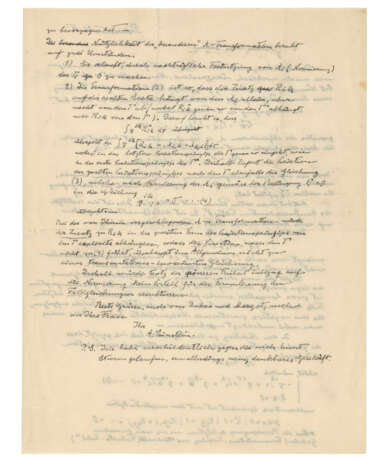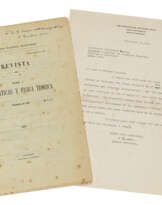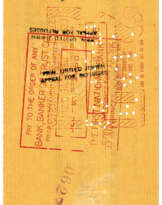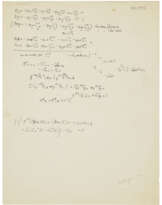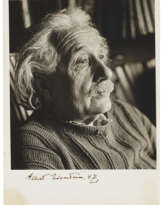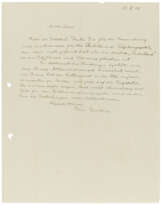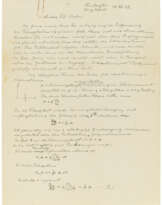ID 794421
Lot 75 | EINSTEIN, Albert (1879-1955)
Valeur estimée
£ 18 000 – 25 000
Autograph letter signed ('A. Einstein') to Ernst Gabor Straus, Princeton, 26 February [1950].
In German. Two pages, 279 x 216mm, including 9 scientific formulas, and numerous other scientific terms within the text.
On symmetry transformations in one of his last models for unified field theory. 'The information about your work is truly surprising for a non-expert like me. It feels like a sort of miracle that the existence of integer-valued derivatives has some connection with the existence of linear differential equations with constant coefficients'. The body of the letter is a dense scientific discussion, in which Einstein argues at length for his preference for a form of a symmetry transformation ('Λ-transformation') based on a real rather than complex term Γ (part of the coordinates for the displacement field), discusses a demonstration he has given in the 'addendum to the appendix' showing the mathematical equivalence between two equation systems, and analyses the utility of his '"special" Λ-transformation' with the aid of a series of formulas, including numbered references to equations (presumably in their joint paper).
The utility of the "special" Λ-transformation is based on two circumstances.
1) It makes it possible, by subsequent determination of Λi (normalisation), to make the Γi equal to 0.
2) The transformation (2) is such that the addition Rik on the right side depends on the Λi alone, but not on the Γ (whereby Rikx depends on the Γx exactly as Rik depends on the Γ). This is based on the fact that
∫gikRikx dτ
turns into ∫gik[Rik - (Λi,k - Λk,i)]dτ
whereby Γ enters into the latter variational principle in exactly the same way as Γx enters into the first variational principle. Therefore, the variation of the second variational principle according to the Γ also yields the equation (3), which after normalisation of the Λi certainly passes into the equation
gik , s = 0 ... (4)
with the condition Γi = 0.
He concludes by pointing to a flaw in Straus's proposed approach: 'In the Λ-µ transformation you propose, the addition to Rik in the second form of the variational principle would explicitly depend on the Γ, so the variation after the Γ does not lead to (4), and not at all to a transmutation-invariant equation in general. / Therefore, despite great freedom in regard to normalisation, there would be no advantage for the formulation of the field equations'. A postscript refers to his repeated attacks on the McCarthyite 'wi[t]ch hunt' (he gives the term in English).
The German-American mathematician Ernst Gabor Straus (1922-1983) was Einstein's assistant at Princeton for four years between 1944 and 1948, during which period they produced three joint papers. The discussion in the letter is closely related to the proposed basis for a unified field theory published in the last of these, 'A Generalization of the Relativistic Theory of Gravitation, II' (Annals of Mathematics, Second Series, Vol. 47, No. 4 (Oct., 1946), pp. 731-741). Einstein had summarised the approach in Appendix II of the third edition of The Meaning of Relativity (1950), to which he refers in ths letter.
Special notice
This lot has been imported from outside of the UK for sale and placed under the Temporary Admission regime. Import VAT is payable at 5% on the hammer price. VAT at 20% will be added to the buyer’s premium but will not be shown separately on our invoice.
| Artiste: | Albert Einstein (1879 - 1955) |
|---|---|
| Lieu d'origine: | Europe de l'Ouest, Allemagne, Europe, Suisse |
| Catégorie maison de vente aux enchères: | Lettres, documents et manuscrits, Médecine et sciences |
| Artiste: | Albert Einstein (1879 - 1955) |
|---|---|
| Lieu d'origine: | Europe de l'Ouest, Allemagne, Europe, Suisse |
| Catégorie maison de vente aux enchères: | Lettres, documents et manuscrits, Médecine et sciences |
| Adresse de l'enchère |
CHRISTIE'S 8 King Street, St. James's SW1Y 6QT London Royaume-Uni | |
|---|---|---|
| Aperçu |
| |
| Téléphone | +44 (0)20 7839 9060 | |
| Commission | see on Website | |
| Conditions d'utilisation | Conditions d'utilisation |

